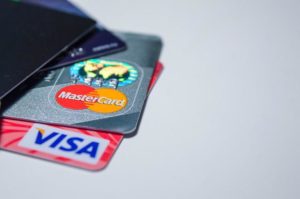I hope you are keeping up with your financial resolutions for 2011. Starting is usually the hardest part until you get some momentum going, and start to see some success. One of the biggest roadblocks to staying on your budget is impulse spending.
Impulse spending is a lot easier if you have “extra” cash on hand or the dangerous ever present Debit Card.. Here’s a couple of ways you can deal with both if they are a challenge for you, as they are for me.
6th in the New Year’s Resolution series, this is a continuation of the section on impulse spending.
Impulse Spending and the Danger of the Debit Card
While we are on impulse spending, it may be a good idea to talk a bit about the great invention of the debit card. For some folks a debit card is a fantastic money saver – weaning us away from maxed out credit cards, and imposing a limit on spending. That’s great, but it’s also a double edged sword. (I believe “all swords are double edged”, but that’s a philosophy discussion, not germain to this one…)
Since I, like many people think of my debit card as “my money” and not borrowed money – as in a credit purchase – it is easier to spend. And as we all know, cash back and cash withdrawals can always put “walking around” cash in our pockets. Bad idea for some of us. Add to that the “off network” withdrawal fees and its a disaster waiting to happen.
The average ATM fee (not including your own bank fees if they charge them) have gone from around $1 in 2003, to $1.78 in 2008, all the way to an average of $3.50. Some ATMs in prime locations such as casinos and high end malls charge $5 or even $10. It’s kind of absurd.
Think about it – if you take out $60 from your ATM via a debit card (the average withdrawal from an ATM) , and you pay $3 , that’s 5%. Not 5% daily, or 5% monthly for 5% a year, but 5% INSTANTLY. So, you instantly add 5% to every impulse item you buy with that money, and you pay for it in advance. Sort of…
So now, I have two ways to help curb that impulse spending. One, I leave the debit card at home. I go to the ATM and take out my “petty cash” for the week and return the card to my desk drawer. I use only the ATM that is part of my bank network, so there is no fee. When I leave the house, I only take out the money that I actually intend to spend throughout the day. This helps you avoid credit card debt. Highly recommended.
If you must take the debit card with you, do something to it to make it harder to use. Like put it in the sleeve it came in, but wrap it up in duct tape. Or scotch tape, or lock it in a tiny safe, where you need to find to the hidden key . (Okay, the tiny safe thing is a little silly…) Don’t damage it, but find a way that you actually have to take some time and think about what you are doing, and ask that powerful question from part 5.
“Will taking this action (purchase) bring me closer to, or further away from my goal?”
You have to somehow “short circuit” the instant impulse to buy. Kind of like that idea about freezing your credit cards in an ice block, just not quite as drastic.
Next – I thought this was pretty clever – I take a 3 x 5 card, and fold it over the top of my bills before they go into my wallet. That way, if I don’t ask that powerful question, and I instantly reach for my wallet, voila! there it is – my reminder. A barrier to impending impulsivity. A second chance to move toward my goal instead of away from it.
You might want to write your resolution or goal on the back of the 3×5 card. So when you reach for that cash – you see the card, you are reminded about your goal. Sort of a new twist on the “string around your finger”. But wait, there’s more!
The other thing to use that 3×5 card for is to write down all of your cash purchases as you make them. And I do heartily endorse trying to move to an all cash transaction basis while you are working on financial goals, and curbing your spending. You can also get “extra fancy”, and get yourself a paperclip with which to hold all of your receipts right along with the card for later tracking.
I hope this helps you stay on track with your Debt Resolution for 2011!
If you’re struggling to pay off debt, ACCC can help. Schedule a free credit counseling session with us today.






